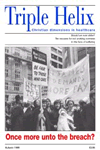I get the strong impression that many health professionals are profoundly ignorant about homoeopathy. The popular myth is that this harmless idea believes in the efficacy of weak solutions. Few people seem to realise that the sort of dilutions advocated by homoeopaths would need a volume at least the size of the North Sea, if not the orbit of Venus, to contain a single molecule of the original substance.
Steven Ransom sets out to expose the intrinsic nonsense at the heart of homoeopathy. He starts with the founder, Samuel Hahnemann. He describes his historical context in the 18th century, his childhood, student days, involvement with freemasonry, occultism and blatant quackery. Hahnemann claimed for instance to have a cure for scarlet fever which was causing appalling epidemics among children at that time. For financial gain, he kept selling his remedy but refused to divulge its secrets. It eventually came to light that it consisted of tiny amounts of belladonna dissolved in '2.4 million drops of water'. This useless substance was then administered with very complicated instructions, which had to be followed precisely for it to be effective. It was therefore always the parents' fault and not his if their child died.
Hahnemann was prosecuted in cities across Europe, before being allowed to settle in Paris. His crackpot theories are described in detail before Steven Ransom reviews the current state of play.
There has been an enormous promotion of homoeopathy in the last 40 years. It is now sold by pharmacists with chain stores such as Boots training their staff in it. As it sweeps all before it (taught in universities, promoted by BUPA, served up in outpa-tient clinics) it has become politically incorrect to challenge it. However, it remains the case that not a single, well constructed trial of homoeopathy with positive findings has ever been successfully repeated by other workers. Theoretically absurd, it has no sound evidence to show that it works. Hopefully this urgently needed little corrective will open a few blind eyes.
Reviewed by
Peter May
(GP, Southampton)































